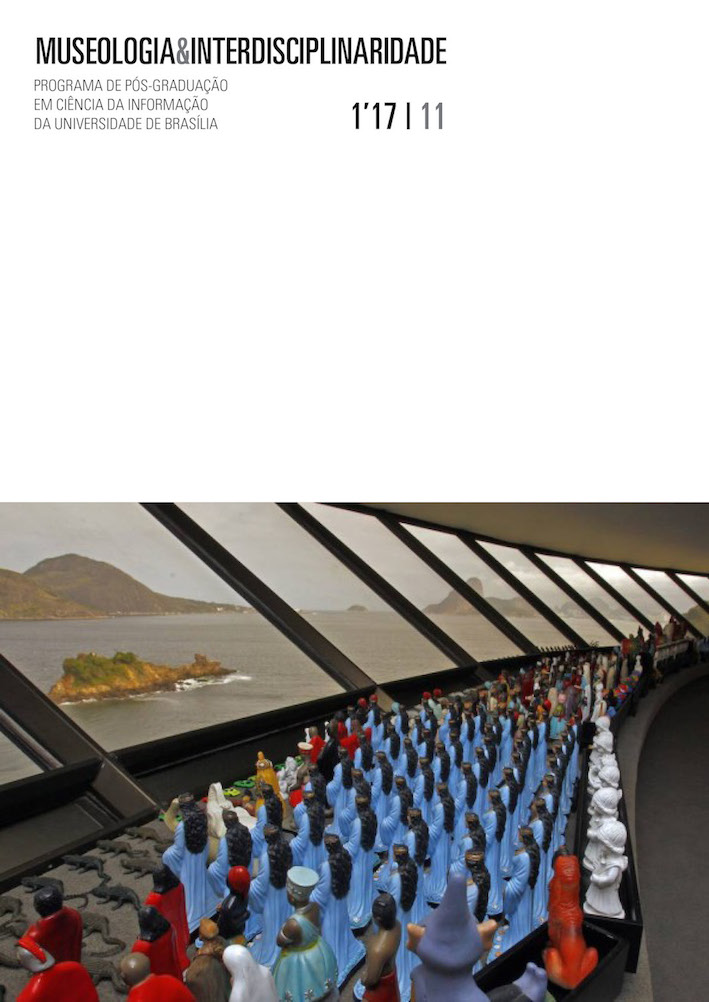Retornar ao fim do império
fazer a memória de uma herança ilegítima
DOI:
https://doi.org/10.26512/museologia.v6i11.17738Keywords:
Illegitimate heritage, Portugal, Colonialism, Return, Exhibition Retornar - Traços de MemóriaAbstract
1974 and 1975 in Portugal were years of change and hope for a new democratic era. But were also the years in which the Portuguese had to confront the heavy legacies of their colonialism. After more than 40 years, the “dark legacies” of the end of the Portuguese empire remain a memorial field fraught with fractures, traumas and silences. From the curatorial experience of the exhibition Retornar - Traços de Memória, this paper intends to explore the theoretical, methodological, epistemological and ideological issues related to the construction of memories of illegitimate inheritances, in particular of Portuguese colonialism.
Downloads
References
Agamben, Giorgio. O Poder Soberano e a Vida Nua - Homo Sacer. Lisboa: Editorial Presença. 1998.
Anderson, Benedict. Imagined Communities. London & New York: Verso, 1983.
Arendt, Hannah, Human Condition. Chicago: University of Chicago Press, 1958.
Bergson, Henti. Matter and Memory. New York: Zone. [1896] 1991.
Cardoso, Dulce Maria. O Retorno. Lisboa: Tinta da China, 2011.
Castelo, Cláudia. Passagens para África: o Povoamento de Angola e Moçambique com naturais da Metrópole (1920-1974). Porto, Edições Afrontamento, 2007.
Chakrabarty, Dipesh. Museums in late democracies. Humanities Research 9(1): 5-12, 2002.
De L’Etoile, B. The past as it lives: an anthropology of colonial legacies, Social Anthropology, 16 (3): 267-279, 2008.
Derrida, Jacques, Mal d’archive: une impression freudienne. [Tradução Cláudia do Rego Monteiro. Rio de Janeiro: Relume-Dumará, 2001.] Paris: Galilée, 1995.
Didi-Huberman, George, Imagens apesar de Tudo. Lisboa: KKYM, 2012.
Dudley, Sandra. H.. Museum materialities: objects, sense and feelings. In Museum
Materialities. London: Routledge, p. 1-17, 2010.
Figueiredo, Isabela. Caderno de Memórias Coloniais. Coimbra: Angelus Novus, 2009.
Gagnebin, Jeanne Marie. Lembrar, Escrever, Esquecer. São Paulo: Editora 34, 2006.
Gil, José. Portugal Hoje ”“ Medo de Existir, Lisboa: Relógio D´Água, 2005.
Gil, José. 2007. Portugal e a síndrome de Liliput. In Trópico, http://www.revistatropico.com.br/tropico/html/textos/2845,1.shl. Publicado em 2/4/2007.Consultado em 14/5/2015.
Góis, Bruno. Retornar à pergunta ‘O que faz partir as gentes?’. In Retornar: Traços de Memória do Fim do Império. Lisboa: Edições 70, 2017.
Handler, Richard & Gable, Eric. The New History in na Old Museum: Creating the Past at Colonial Williamsburg. Durham and London: Duke University Press: 1997.
Hirsch, Marianne Family Frames: Photography, Narrative and Postmemory. Cambridge, Mass.: Harvard University Press, 1997.
Jackson, Michael. Lifeworlds: Essays in Existential Anthropology. Chicago: The University of Chicago Press, 2013.
Kalter, Christoph. 2017. Gente pós-colonial: quem eram os retornados? In Retornar: Traços de Memória do Fim do Império. Lisboa: Edições 70.
Levi, Primo, Os que Sucumbem e os que se Salvam. Lisboa: Teorema, 2008.
Lourenço, Eduardo. O Labirinto da Saudade: Psicanálise Mítica do Destino Português. Lisboa: Publicações Dom Quixote, 1978.
Lubkemann, Stephen C. The moral economy of Portuguese postcolonial return, Diaspora, 11(2): 189-213, 2002.
Lubkemann, Stephen C. The moral economy of non-return among socially-diverted migrants from Portugal and Mozambique. In Migration and Economy: Global and Local Dynamics. Society for Economic Anthropology Monographs. NewYork: Altamira Press, 2005.
Macdonald, Sharon. Difficult Heritage. Negotiating the Nazi Past in Nuremberg and Beyond. Routledge. London & NewYork, 2009.
Peralta, Elsa. Fictions of a creole nation: (re) presenting Portugal’s imperial past. In Negotiating identities: constructed selves and others. Amsterdão, Nova Iorque: Rodopi, p. 193-217, 2011.
Peralta, Elsa. A composição de um complexo de memória imperial: O caso de Belém, Lisboa. In Cidade e Império: Dinâmicas Coloniais e Reconfigurações Pós--coloniais. Lisboa: Edições 70, p. 361-407, 2013.
Peralta, Elsa & Oliveira, Joana. Pós-memória como herança: fotografia e testemunho do ‘retorno’ de África. Configurações, 17: 181-197, 2016.
Peralta, Elsa, Góis, Bruno & Oliveira, Joana (orgs.), Retornar: Traços de Memória do Fim do Império. Lisboa: Edições 70, 2017.
Pires, Rui Pena. Os Retornados: Um Estudo Sociográfico. Lisboa: Instituto de Estudos para o Desenvolvimento, 1984.
Plummer, Ken. The call of life stories in ethnographic research. In Handbook of Ethnography. Londres: Sage, p. 395-406, 2007.
Portelli, Alessandro. What makes oral history different? In The Oral History Reader. Londres: Routledge, p. 63-74, 1998.
Rosas, Fernando, Machaqueiro, Mário & Oliveira, Pedro Aires. O Adeus ao Império: 40 anos de Descolonização Portuguesa. Lisboa: Nova Veja, 2015.
Savarese, Eric. After the Algerian war: reconstructing identity among the Pieds-noirs. International Social Science Journal, 58 (189): 457-466, 2006.
Thrift, Nigel. Intensities of Feeling: Toward a Spatial Politics of Affect. Geografiska Annaler 86B(1): 57-78, 2004.
Tunbridge, John E. & Ashworth. Gregory John. Dissonant Heritage: the Management of the Past as a Resource in Conflict. Chichester: John Wiley and Sons, 1996.
Waterston, Alisse. The story of my story: an anthropology of violence, dispossession, and Diaspora, Anthropological Quarterly, 78 (1): 43-61, 2005.
Williams, Paul. Memorial Museums: The Global Rush to Commemorate Atrocities. Oxford: Berg, 2007.
White, Bob W. & Strohm, Kiven. Preface: ethnographic knowledge and the aporias of intersubjectivity. Hau: Journal of Ethnographic Theory, 4(1): 189-197, 2014.
Zerubavel, Eviatar. The Elephant in the Room: Silence and Denial in Everyday .


